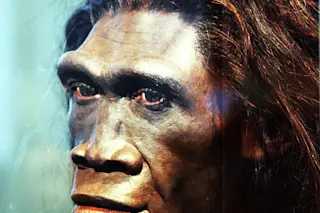A reconstruction of a female Homo erectus. Reconstruction by John Gurche; photographed by Tim Evanson A long-discounted theory about the evolution of skin color may have had it right all along, new research suggests. Darker skin gives individuals much greater protection from UV light-induced skin cancer. Pale-skinned people are roughly 1,000 times more likely than individuals with dark skin to suffer from the three most common skin cancers. But for years, researchers believed the lowered risk was an incidental benefit, not one derived through the pressure of natural selection. Even Charles Darwin poo-poohed the notion that pigmentation could be an adaptive trait. A new study, however, finds evidence that skin cancer was in fact a driving evolutionary force for early hominids to have darker skin.
The findings were based studying people with albinism in equatorial Africa, which has the highest UV radiation exposure on the planet. The study, based on ...














